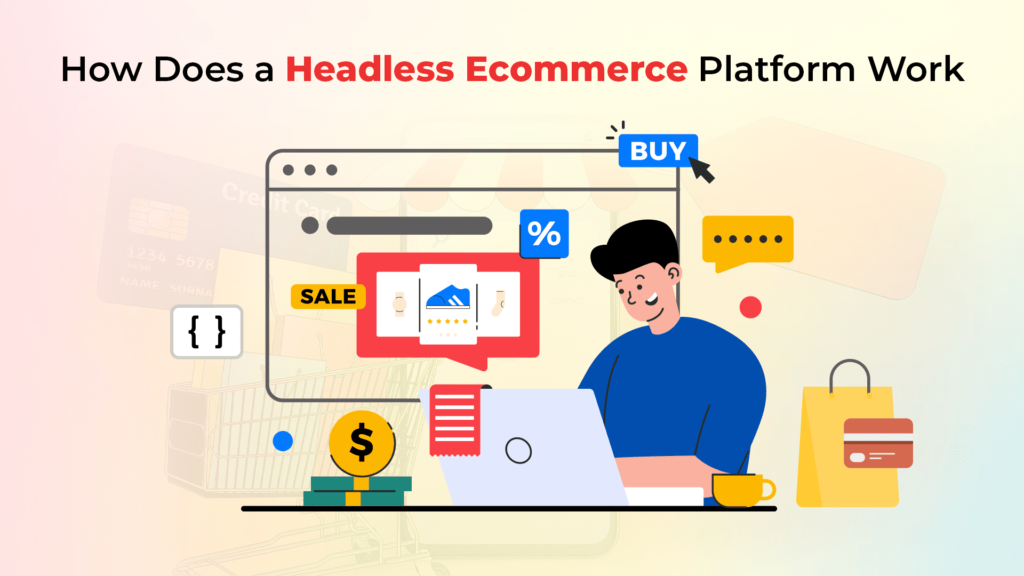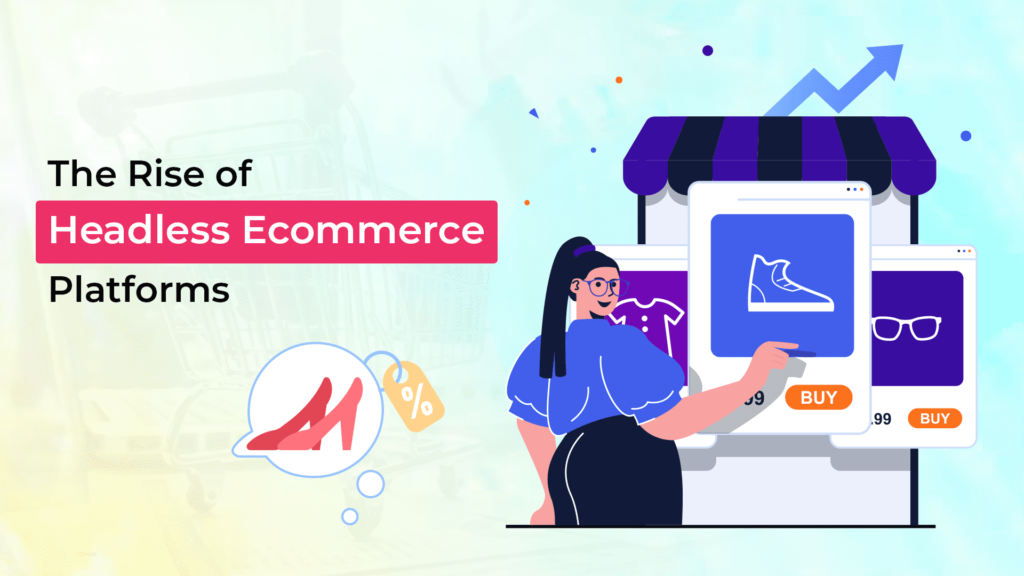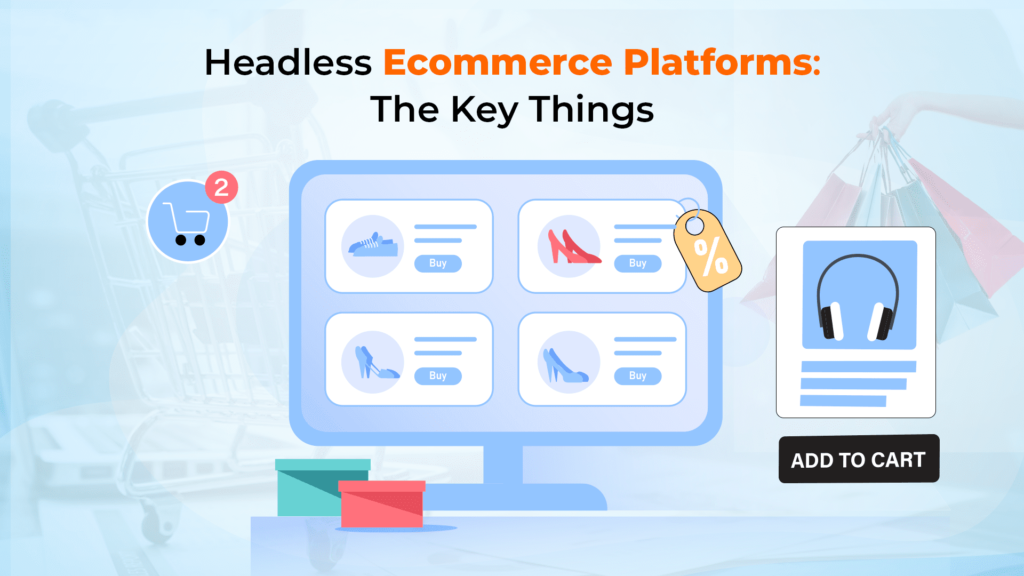Are you wondering why headless ecommerce platforms are becoming so popular? In this article, we’ll cover everything you need to know about them, including headless ecommerce examples, benefits, and more!
Introduction of Headless Ecommerce Platforms

In today’s digital age, ecommerce platforms are crucial for online businesses. Firstly, they enable efficient management of products, orders, and payments. Additionally, they make global selling easier and more accessible.
Traditional ecommerce platforms have been around for many years, but a new breed of platform is gaining popularity – the headless ecommerce platform.
How Does a Headless Ecommerce Platform Work

A headless ecommerce platform is one that doesn’t have pictures or buttons you can click on. Instead, it uses a set of tools called APIs that let you do things like add or change products, process orders, and take payments..
Developers can then use these APIs to build custom front-ends that can be used with the platform’s back-end.
Companies can design their own unique ways for people to use their online shops. This helps them to have more choices and power to manage their ecommerce stores.
The Rise of Headless Ecommerce Platforms

So why are headless ecommerce platforms becoming so popular? There are a few reasons:
Flexibility
Headless ecommerce platforms are like online shops that let you change how they look without changing how they work. This is possible because the way they look is separate from the way they work. So, you can make the shop look the way you want it to look.
Because the frontend is no longer tied to the backend, designers and developers can create unique, engaging experiences for customers without being limited by the constraints of the ecommerce platform.
Scalability
Headless ecommerce platforms also offer greater scalability than traditional platforms. Because the frontend and backend are separate, it’s easier to scale each component independently.
Basically, you can increase the capacity of your website’s front-end servers to manage a sudden increase in traffic, without any concern about the back-end infrastructure. Therefore, scaling up the servers ensures the website’s smooth functioning.
Future-proofing
Finally, headless ecommerce platforms are seen as a way to future-proof your ecommerce store.
When you divide the part of the website that people see from the part that works behind the scenes, you make it easier to change and update it later on when new things come out.
Headless Ecommerce Platforms: The Key Things

If you’re considering a headless ecommerce platform for your store, there are a few things you should keep in mind
You’ll Need a Frontend
Because headless ecommerce platforms separate the frontend and backend, you’ll need to create a frontend in order to display your products and interact with customers.
This can be a custom-built frontend or a third-party frontend framework.
APIs Are Key
To connect your frontend and backend, APIs (Application Programming Interfaces) are necessary. APIs establish communication rules for different software components.
With a headless ecommerce platform, you’ll be relying heavily on APIs to ensure that your frontend and backend can talk to each other seamlessly.
Multi-Channel Support
Headless ecommerce platforms empower businesses to deliver their ecommerce experience seamlessly across various channels and devices, such as web, mobile, social media, and voice assistants, among others.
This can help businesses find new customers and gives customers more choices.
Integration with Other Systems
Headless ecommerce platforms can be easily integrated with other systems and tools, such as marketing automation platforms, customer relationship management (CRM) software, and analytics tools.
When businesses combine their systems, they can make their marketing and sales plans better and learn more about how their customers behave. This helps them improve how they work and do even better.
Headless Ecommerce Platform Examples
There are several headless ecommerce platforms available on the market, each with its own set of features and benefits. headless ecommerce examples Here one popular platform:
Webnexs offers a variety of e-commerce solutions, including both ready-made and customized platforms.
Their ready-made solutions include the Webnexs Wcomm platform, which is a comprehensive e-commerce solution that comes with a range of features such as multi-language support, multi-currency support, and a user-friendly interface. They also offer the Webnexs Marketplace platform,
Furthermore, it is a comprehensive multi-vendor platform enabling businesses to establish personalized online marketplaces and manage them independently
Overall, Webnexs is a comprehensive e-commerce solution provider that offers a range of services to help businesses grow their online presence.
They have a group of skilled people who know how to make websites, advertise online, and create phone apps. They can help any business do well in the tough world of online buying and selling, no matter how big or small the business is.
Frequently Asked Question(FAQs)
1. What is a Headless Ecommerce Platform?
Headless Ecommerce Platform is a system that separates the front-end and back-end of an ecommerce website, allowing for more flexibility and customization in design and user experience.
2. What are the benefits of using a Headless Ecommerce Platform?
Using a Headless Ecommerce Platform provides advantages such as enhanced flexibility, improved performance, scalability, and the ability to deliver consistent experiences across multiple channels.
3. How does a Headless Ecommerce Platform improve flexibility?
By decoupling the front-end and back-end, businesses can easily modify the user interface without affecting the underlying commerce functionality, enabling seamless experimentation and customization.
4. Can a Headless Ecommerce Platform support omnichannel experiences?
Yes, a Headless Ecommerce Platform is designed to support omnichannel experiences, allowing businesses to provide a consistent customer experience across various channels, including websites, mobile apps, and IoT devices.


Leave a Reply to Linious Cancel reply